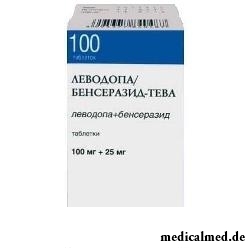





Levodopa / Benserazid-Teva
Application instruction:
 Levodopa / Benserazid-Teva – the medicine applied at Parkinson's disease.
Levodopa / Benserazid-Teva – the medicine applied at Parkinson's disease.
Form of release and structure
The levodopa / Benserazid-Teva is issued in the form of tablets: pink, round, with an easy mramornost, on both parties – crosswise risk; on 100 mg of a levodopa – biconvex; on 200 mg of a levodopa – flat, with a facet, on one of the parties – in two sections crosswise risks an engraving of "B" and "L" (on 20, 30, 50, 60 or 100 pieces in bottles from PHD (polyethylene of high density), on 1 bottle in a cardboard pack).
Active ingredients are a part of 1 tablet:
- Levodopa – 100 or 200 mg;
- Benserazid – 25 or 50 mg (in the form of a hydrochloride of a benserazid – 28,5 or 57 mg).
Auxiliary components (100/200 mg of a levodopa respectively): Mannitolum – 89,15/178,3 mg, prezhelatinizirovanny corn starch – 18,7/37,4 mg, microcrystallic cellulose – 4,95/9,9 mg, K25 povidone – 11/22 mg, anhydrous calcium hydrophosphate – 7,97/15,94 mg, colloid silicon dioxide – 0,71/1,42 mg, кросповидон (type A) – 8,25/16,5 mg, dye iron oxide red (E172) – 0,27/0,54 mg, magnesium stearate – 5,5/11 mg.
Indications to use
The levodopa / Benserazid-Teva is appointed for treatment of a disease of Parkinson.
Contraindications
- Heavy functional disturbances of bodies of endocrine system, liver, kidneys;
- Exogenous and endogenous psychoses;
- Glaucoma;
- Dysfunctions of cardiovascular system in severe forms;
- Combination therapy with non-selective monoamine oxidase inhibitors, a combination of monoamine oxidase inhibitors of type A and B;
- Pregnancy and period of chest feeding;
- Age up to 25 years;
- Childbearing age at women (without use of reliable contraceptive methods);
- Hypersensitivity to drug components.
Route of administration and dosage
The tablets Levodopa / üÑ¡ßÑÓếñ-Тева accept inside, observing intervals with meal (it is desirable – not less than in 30 minutes prior to or in 1 hour after).
Therapy is begun with small doses, increasing them gradually (individually for each patient) before achievement of therapeutic effect. High doses for a concomitant use of drug need to be avoided.
If the levodopa is appointed for the first time, the initial single dose makes 50 mg of a levodopa / 12,5 mg of a benserazid, frequency rate of reception – 2-4 times in day. At good tolerance of 1 times in 3 days the dose is increased by 50-100 mg of a levodopa before achievement of therapeutic effect.
Further selection of a dose is carried out once a month. The therapeutic effect is, as a rule, noted already at reception of 200-400 mg of a levodopa / 50-100 mg of a benserazid in day (as much as possible – 800 mg of a levodopa / 200 mg of a benserazid).
The daily dose should be divided into 4 and more receptions (for ensuring optimum therapeutic effect). At development of side effects it is necessary to reduce a daily dose or to stop increase in a dose.
Achievement of optimum therapeutic effect usually happens at reception of 300-800 mg of a levodopa / 100-200 mg of a benserazid.
The patients accepting earlier a levodopa should begin use of the drug Levodopa / üÑ¡ßÑÓếñ-Тева in 12 hours after the termination of reception of a levodopa. The dose is appointed of about 20% of the previous dose of a levodopa that allows to keep the reached earlier therapeutic effect. Further if necessary the dose is increased according to the scheme described for the patients who were earlier not accepting a levodopa.
Patients who accepted a levodopa combination with inhibitor of a decarboxylase of aromatic L-amino acids earlier use of the drug Levodopa / üÑ¡ßÑÓếñ-Тева needs to be begun in 12 hours after the termination of reception of such medicine. For minimization of decrease in already reached therapeutic effectiveness it is necessary to interrupt the previous therapy at night, to begin to accept the tablets Levodopa / üÑ¡ßÑÓếñ-Тева with the next morning. Further if necessary the dose is increased according to the scheme described for the patients who were earlier not accepting a levodopa.
The levodopa / Benserazid-Teva can be appointed by the patient who was earlier accepting other protivoparkinsonichesky medicines. At achievement of obvious therapeutic effect review of the scheme of therapy with reduction or cancellation of alternative drug is possible.
At strong motor fluctuations it is recommended to increase frequency rate of administration of drug without change of a daily dose. To elderly patients the dose is increased more slowly. Experience of therapy at children and teenagers is limited.
Dose adjustment at a liver and renal failure of average and easy weight is not required.
The dose needs to be reduced at emergence of spontaneous movements like an athetosis or a chorea at late stages of therapy.
At long treatment episodes of "hardening", a phenomenon of "inclusion switching off" and easing of effect to the end of time of action of a dose can be reduced or eliminated considerably with a dose decline or more frequent use of drug in a smaller dose. For strengthening of effect of treatment further it is possible to increase a dose again.
At development of side effects from cardiovascular system it is necessary to lower a dose.
Side effects
During performing therapy with various frequency disturbances from various systems of an organism can develop (very often – not less than 10%; often – it is not less than 1% also of less than 10%; sometimes – it is not less than 0,1% also less than 1%; seldom – it is not less than 0,01% also of less than 0,1%; very seldom – it is less than 0,01% taking into account single messages):
- Cardiovascular system: very seldom – arrhythmias, increase in arterial pressure, orthostatic hypotension (as a rule, weakens after a dose decline); with an unknown frequency – "inflows";
- Hemopoietic system: very seldom – a tranzitorny leukopenia, hemolitic anemia, thrombocytopenia;
- Digestive tract: very seldom – dryness of a mucous oral cavity, nausea, diarrhea, vomiting, separate cases of change or loss of flavoring feelings; with an unknown frequency – gastrointestinal bleedings;
- Nervous system: often – spasms, strengthening of manifestations of a syndrome of "uneasy legs", dizziness, a headache, episodes of "hardening", spontaneous motive frustration (like an athetosis and a chorea), easing of effect to the end of time of action of a dose, a phenomenon of "inclusion switching off"; very seldom – episodes of sudden drowsiness, the expressed drowsiness;
- Hypodermic fabrics and skin: seldom – rash, a skin itch;
- Laboratory indicators: infrequently – increase in creatinine and urea in blood, concentration of bilirubin, tranzitorny increase in activity of "hepatic" transaminases, an alkaline phosphatase, urine discoloration to red, when standing – darkening;
- Mentality: seldom – moderate delight, the raised libido, agitation, sleeplessness, the suppressed mood, alarm, anorexia, nonsense, a depression, aggression, pathological hyper sexuality, tendency to gamblings; very seldom – a short disorientation, hallucinations;
- Others: with an unknown frequency – the increased perspiration, febrile fever.
Special instructions
The side effects from the alimentary system arising most often at initial stages of therapy are eliminated substantially at reception of the tablets Levodopa / üÑ¡ßÑÓếñ-Тева with a small amount of liquid or write, and also at slower increase in a dose. Use of drug for treatment of a chorea of Gentington and an iatrogenic extrapyramidal syndrome is not recommended.
In the presence of anamnestic data on ulcers of digestive tract, osteomalacy and spasms it is necessary to control the corresponding indicators regularly. In the course of therapy it is necessary to carry out control of indicators of function of kidneys, liver and blood count. Patients with coronary heart disease, a myocardial infarction, disturbances of a heart rhythm in the anamnesis should carry out control of the electrocardiogram regularly.
Patients with anamnestic data on orthostatic hypotension have to be under medical observation, in particular at the beginning of therapy.
At a diabetes mellitus it is necessary to control often concentration of glucose in blood and to carry out dose adjustment of peroral hypoglycemic drugs. During therapy it was reported about cases of sudden approach of a dream that patients need to consider.
Use of the drug Levodopa / üÑ¡ßÑÓếñ-Тева increases probability of developing of a malignant melanoma (including in the anamnesis, administration of drug is not recommended to patients with a malignant melanoma) and compulsive frustration.
Before carrying out the general anesthesia therapy should be performed is longer, except for a galotanovy anesthesia (because of probability of development of fluctuations of arterial pressure and arrhythmia treatment needs to be cancelled in 12-24 hours before performing surgery). After operation treatment is resumed with gradual increase in a dose.
Sharply it is impossible to stop therapy as it can lead to "withdrawal" (in the form of fervescence, muscle tension, and also possible mental changes and increase in activity of a kreatininfosfokinaza in blood serum) or to akinetic crises (in certain cases – in life-threatening forms). At emergence of such symptoms of the patient has to be under medical observation (hospitalization is in case of need possible) with receiving the corresponding therapy which can include repeated purpose of the drug Levodopa / üÑ¡ßÑÓếñ-Тева.
The depression can be clinical display of the main disease (parkinsonism) or develop against the background of drug use. For early detection of undesirable mental reactions it is necessary to watch a condition of such patients.
Emergence of the cognitive and behavioural frustration connected with uncontrollable use of the increasing doses of drug and significant increase in therapeutic doses is in certain cases noted.
At development during therapy of excessive day drowsiness or sudden episodes of a dream it is necessary to refuse driving or work with the equipment. At emergence of these symptoms it is necessary to consider the possibility of reduction of a dose or drug withdrawal.
Medicinal interaction
At joint purpose of the drug Levodopa / üÑ¡ßÑÓếñ-Тева with some medicines there can be following effects:
- Trigeksifenidil (m-holinoblokatory): reduction of speed (but not degrees) absorptions of a levodopa;
- Ferrous sulfate: decrease in Cmax (the maximum concentration of substance in blood) and AUC (total concentration of substance in a blood plasma) levodopas;
- Antacids: decrease in extent of absorption of a levodopa / бенсеразида;
- Non-selective monoamine oxidase inhibitors, combination of the selection monoamine oxidase inhibitors of type A and B: development of hypertensive crisis (the combination is contraindicated, it is necessary to observe a break not less than 14 days);
- Metoclopramidum: increase in speed of absorption of a levodopa;
- Opioids, neuroleptics, hypotensive drugs with the maintenance of Reserpinum: suppression of action of a levodopa / бенсеразида (it is necessary to use the lowest doses of these medicines);
- Pyridoxine: reduction of protivoparkinsonichesky action of a levodopa / бенсеразида;
- The selection monoamine oxidase inhibitors of type A and B (разагилин, селегилин, моклобемид): increase in effect of a levodopa / бенсеразида, dangerous interaction is not revealed;
- Hypotensive drugs: development of orthostatic hypotension;
- Sympathomimetics (amphetamine, Norepinephrinum, Epinephrinum, Isoproterenolum): potentiation of their action (the combination is not recommended, in need of simultaneous use it is necessary to control carefully a condition of cardiovascular system, the dose of sympathomimetics is reduced if necessary);
- Other protivoparkinsonichesky drugs (anticholinergic medicines, agonists of dopamine receptors, амантадин): strengthening of therapeutic and undesirable effects (dose adjustment of a levodopa / бенсеразида or other medicine can be required);
- Inhibitor catechol-au-methyltransferase: control is necessary, dose adjustment of a levodopa / бенсеразида can be required;
- Galotanovy anesthesia: development of arrhythmia and fluctuation of arterial pressure (therapy by the drug Levodopa / üÑ¡ßÑÓếñ-Тева should be cancelled in 12-48 hours prior to carrying out operation);
- Food, protein-rich: decrease in therapeutic effect of drug.
The levodopa / Benserazid-Teva can influence results of laboratory researches of creatinine, catecholamines, glucose, uric acid, bilirubin, an alkaline phosphatase. Definition of increase in concentration of creatinine and urea in blood, false positive result of test of Koombs, false-negative reaction to glucose in urine is possible at its definition by means of a glucose glucose oxydas method.
Terms and storage conditions
To store in the place, dry, unavailable to children, at a temperature up to 25 °C.
Period of validity – 2 years.
The weight of a human brain makes about 2% of all body weight, however it consumes about 20% of the oxygen coming to blood. This fact does a human brain extremely susceptible to the damages caused by shortage of oxygen.

Life expectancy in various regions of Earth is not identical. Exert impact on it social stability, economic бл...
Section: Articles about health
The problem of diagnosis was and remains to one of the most important in medicine. From that, the reason of an indisposition of the patient will be how precisely defined, eventually success of treatment depends. In spite of the fact that the majority of the diagnostic methods applied in about...
Section: Articles about health
Eyes – one of the most vulnerable areas on a face therefore age changes concern them first of all. Whether it is possible to keep look youth for many years and what procedures are offered for achievement of this purpose by cosmetologists? And maybe, the only option of rejuvenation is surgery – a blepharoplasty? Let's try to understand this question....
Section: Articles about health
Condition of lips (their morbidity, outward) – one of indicators of health of the person. Peeling, dryness, pallor, and also трещ...
Section: Articles about health
For the time being the perspective of heart diseases seems to most of people remote and foggy. But sooner or later practically each adult faces extremely unpleasant feelings: sudden stethalgia. To be consoled at this time in a thought of t...
Section: Articles about health
During foot walks blood moves on vessels more actively and one and all bodies are supplied with a large amount of oxygen. It affects the state of health of the person very positively....
Section: Slideshow
For most of the working people the problem of having a snack is particularly acute enough. Sooner or later there is a question: what is possible quickly for a sja...
Section: Articles about health
More than a half of the married couples which faced prostatitis – leave. The new broadcast "Female View of Prostatitis" will help to learn – whether you have or your relatives problems....
Section: Articles about health
It is known that the person for 80% consists of water which participates in all processes of an organism. The person loses liquid daily – as a result of sweating, breath, an urination, and its insufficient completion due to various reasons can lead to dehydration of varying severity. Dehydration (dehydration) occurs already in case of loss of liquid in number of 1% of body weight and can result both in easy thirst, and by the death. In time to notice signs обезвож...
Section: Articles about health
Such trouble as the milkwoman's attack, at least once in life happened almost to each woman. Prevalence забол...
Section: Articles about health
Extracorporal fertilization – one of the most modern methods of controlling with infertility. So far he already helped a significant amount of married couples to become happy parents. Usually to the EKO procedure difficult and very expensive, resort in those...
Section: Articles about health
Food with the increased content of sugar is attractive to most of people - it is scientifically confirmed fact. Business here not in intemperance or dissoluteness: the sweet food is associated since childhood with feeling of rest and safety which tests the kid when it absorbs maternal milk. Besides, getting into a human body, sugar strengthens production of "happiness hormones" which all of us so need. And still life of sweet teeth seldom happens cloudless: their too big loss...
Section: Articles about health
The drugs stopping or oppressing life activity of pathogenic microorganisms are widely applied in clinical practice with 4...
Section: Articles about health
Sugar - the digestible refined product which is not of special value for an organism of the modern person. The use of sugar in food is based rather on the psychological dependence caused by desire to indulge itself with something tasty, and in дальнейш...
Section: Articles about health
Kidneys perform the most important function of clarification of blood from those products of metabolic processes which cannot be used by an organism for obtaining energy and construction of new cells. With the urine produced by kidneys from a body of the person the bulk of the toxins getting to it with food and water is removed. Normal functioning of kidneys provides removal from an organism of excess liquid and maintenance of optimum ionic balance. At emergence of failures in work of secretory system...
Section: Articles about health
Today about 30 diseases, sexually transmitted are known. To wide circulation of these illnesses extremely with...
Section: Articles about health
Dogrose – one of the most widespread adornment and medicinal plants growing practically in all territory of our country. To most of Russians it is a beautiful bush it is known, first of all, as a source of fruits, extremely vitamin-rich....
Section: Articles about health
We present to yours the TOP of the medicamentous means exerting the stimulating impact on a potentiality, i.e. on ability of the man to commission of sexual intercourse. At once it is necessary to tell that not always disturbances of erectile function can be eliminated with reception of this or that drug. The reasons of decrease in a potentiality there can be a set, from banal overfatigue before tumoral process in a small basin therefore if the man faces similar problems too often, it should turn...
Section: Articles about health
Any of us is not insured from a heavy illness of the loved one. Happens and so that someone from family members becomes lying бо...
Section: Articles about health
Obesity is called a disease of 21 centuries, for the last 100 years the number of the people suffering from excess body weight considerably increased. Statistically, on Earth already about 1,5 billion corpulent people, and 500 million from them have extreme degree of completeness, are negative...
Section: Articles about health
The state of health of the person in many respects depends on food. The organism will well function if during food it receive only useful substances, necessary vitamins and microelements. In this case there will be no problems with digestion, with excess weight, and intellectual and physical activity will remain at the high level....
Section: Articles about health
Use of medicinal plants in therapy is urgent today, more than ever. The drugs made of curative herbs cannot on...
Section: Articles about health
On health of the person physicians know about salutary action of animals long ago. About 7 thousand years ago great Hippocrates recommended to the patients riding walks for strengthening of a nervous system and increase in vitality....
Section: Articles about health
A little more than a century ago goat milk was a traditional food stuff of most of Russians. Unfortunately, today on tables of our compatriots it appears extremely seldom. The reason that the use of so useful product practically came to naught, not only in very modest volumes of its production and, respectively, rather high cost. Potential consumers are just insufficiently informed on unique properties of goat milk and that advantage which...
Section: Articles about health
The advantage of swimming for the person is so high that this sport is not only the most popular, but also is widely applied in copper...
Section: Slideshow
Epilepsy is one of widespread neurologic diseases. Parents, whose children suffer from this illness, should face rumors and delusions, many of which remained since the Middle Ages....
Section: Articles about health
Partial and the more so full loss of hearing significantly reduces quality of life. Difficulties with communication lead to loneliness and isolation. The person who badly hears experiences difficulties with social and professional implementation, quite often has problems in private life....
Section: Articles about health
